
March 16, 2020
Officials around the world say that “social distancing” is the key to slowing the spread of coronavirus. But does that mean you can have friends over, and what do you do if you live with someone who’s throwing caution to the wind? We asked three experts for their thoughts.
What are the safest ways to socialize right now?
Dr Thomas Chin-Chia Tsai: “Avoid situations where there are crowds. That doesn’t mean that people have to go into self-isolation unless they have actual symptoms and need to self-quarantine. It’s okay to go for a walk outside. You can still get takeout from restaurants. If you’re asymptomatic, you can still maintain your family relationships as you otherwise would – just avoid larger groups. It’s still just about decreasing the frequency of interactions.”

Dr Arthur L Caplan: “Right now, mental health has to take a secondary place. Stay indoors, stay away from others as much as you can, and get your food delivered. Minimize your trips out for medicine or to the grocery store. Bring your hand sanitizer and use it all the time. Don’t shake hands. Don’t use paper money. Get ready to do a lot of television watching. You should call your shut-in parents and so forth.”
Is it safe to have friends over?
Dr Jessica Justman: “If gatherings are small, I am still going to say it’s generally OK, depending on who the individuals are. The CDC guidelines for people living in the New Rochelle containment area specifically talk about older individuals with chronic health conditions trying to limit themselves to social gatherings with fewer than 10 people. In Austria, [officials] said you shouldn’t be with more than five. I honestly think these are numbers that people are pulling out of the air, but people need guidelines.”
Tsai: “Assuming that everybody’s asymptomatic, then it’s probably safe. But within the confines of that social interaction, still practice social distancing. Be careful about surfaces that are being touched or shared. Making sure everybody washes his hands and cleans surfaces. Maybe don’t shake hands. It’s still important to still maintain social relationships, but do it in a thoughtful way.”
If my roommate or partner isn’t practicing social distancing, how can I protect myself?
Tsai: “I would recommend that you would still follow the same social distancing principles. The ultimate goal is to break the chain of transmission. If you can maintain your own distance sort of respectfully, then you can still minimize not just the risk to yourself but also the risk from you potentially transmitting to other friends and families in your social circle. Each individual is an opportunity to break that transmission. So even though others around you may be in less than ideal social distancing scenarios, there’s an important individual obligation to do what you can within reasonable or social bounds.”
Caplan: “Do you do your best to socially distance. Maybe don’t sleep in the same bed? Minimize sexual contact. Don’t share toothbrushes. Try to use separate things. You don’t want to be hugging and kissing. You always want to use good hygiene in terms of sneezing and coughing and still doing the hand washing thing frequently. You want to clean surfaces frequently. You might not want to share the same forks and knives unless you’re really sure they’ve been washed thoroughly. That kind of thing. You can have a discussion about how you would divide up your living space – but if they won’t go along, get away.”
Justman: “I think we need to split the scenarios into at least two different categories. Let’s say you were telling me that your spouse is a doctor who sees patients all day. If you were younger and otherwise healthy, I think I would tell you to try not to worry, to encourage your spouse to change clothes and take a shower as soon as they walk in the door. And of course, you’ll keep an eye on your spouse to see if your spouse is starting to have any symptoms, fevers or a cough, that type of thing. If you’re somebody who’s more vulnerable to having a more severe case of Covid-19 related pneumonia then I might tell you to think about ways to have some separation in the home. Or can you go and stay somewhere with a friend or family member for a while until things improve, just to minimize your risk?”
“The second scenario is with the roommate going to bars and gyms. If you are somebody who’s at higher risk, I would tell you to perhaps even see if there’s somewhere else you can go and stay for a while. Just to protect yourself. You can always try to have a conversation with the roommate to say, gee, you know, I’d be much more comfortable if you would not go out so much and not go to crowded places. But I think those are hard conversations to have. And I think it’s much easier to take steps to protect yourself but that doesn’t require other people to change their behavior.”
How do you recommend talking about social distancing with a partner or roommate?
Tsai: “Explain that the goal is to decrease the risk of infecting a lot of people at the same time. And that as an individual, it may seem that you have very little agency in the progression of Covid-19, but that you actually have a very real role and a very important role in breaking the transmission, because, for every individual who gets infected, two to three others will be affected. That’s two or three loved ones or friends you could potentially prevent from getting infected.”
- Dr Arthur L Caplan is a professor and founding head of the Division of Medical Ethics at NYU School of Medicine
- Dr Thomas Chin-Chia Tsai is a surgeon and health policy researcher at Brigham and Women’s Hospital and Harvard T.H. Chan School of Public Health
- Dr Jessica Justman is a professor and attending physician in the Division of Infectious Diseases at the Columbia University Irving Medical Center


